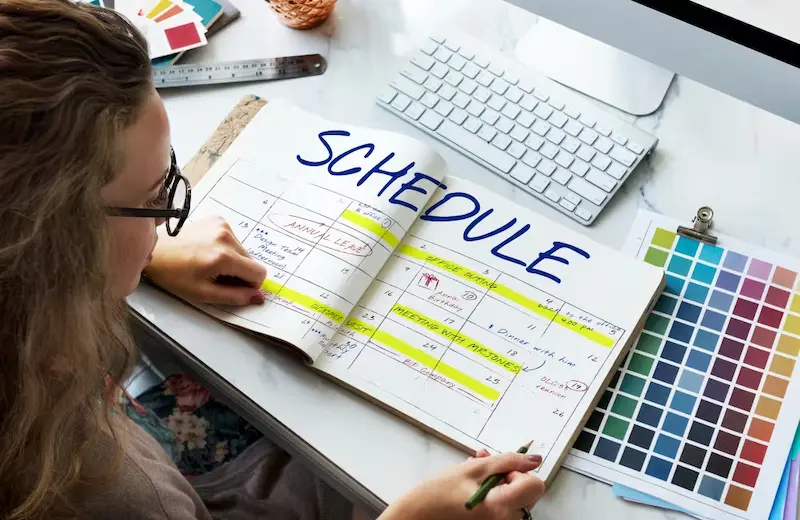Are you searching for the best study tips for students that can help you improve your grades, stay organized, and make studying less stressful? You’re not alone. Many students struggle with staying focused, managing time, and retaining what they learn. The good news is, with the right strategies, studying can become more productive, engaging, and even enjoyable.
In this guide, we’ll walk you through practical and proven techniques that can help students of all levels maximize their learning potential.
1. Create a Study Schedule and Stick to It

One of the most effective study tips for students is to plan your study time carefully. A study schedule gives structure to your learning process, helps you avoid procrastination, and ensures that you cover all subjects systematically.
Tips for making a study schedule:
- Use a planner or digital calendar to mark study sessions for each subject.
- Follow the Pomodoro Technique: Study for 25-50 minutes, then take a 5-10 minute break. After 3-4 cycles, take a longer break of 20-30 minutes.
- Prioritize difficult subjects for your peak focus hours (usually morning or early afternoon).
- Balance your schedule to include revisions, practice sessions, and leisure time.
A consistent schedule trains your brain to focus during study hours, making learning more efficient.
2. Choose the Right Study Environment
Where you study can significantly impact your concentration and retention. A suitable environment reduces distractions and keeps you motivated.
Tips to create an ideal study environment:
- Choose a quiet place like a library, study room, or a quiet corner at home.
- Ensure good lighting to reduce eye strain. Natural light is best if possible.
- Keep your study area clean and clutter-free, with all essential materials (books, notes, stationery) within reach.
- Limit distractions: put your phone on silent or use apps that block social media during study time.
Some students thrive with soft background music, while others need complete silence—experiment to see what works best for you.
You may also like to read this:
How To Focus While Studying: Proven Tips For Students
Daily Study Routine For Exams: Boost Productivity Fast
Time Management Tips For Students – Boost Productivity
How To Improve Memory For Studying: Top Tips For Students
3. Use Active Learning Techniques
Instead of passively reading textbooks, actively engage with the material. Active learning helps you understand concepts deeply and improves memory retention.
Active learning strategies include:
- Summarize what you read in your own words to ensure you understand it.
- Teach someone else what you’ve learned—it forces you to organize and recall information clearly.
- Use flashcards for key terms, formulas, or definitions. Apps like Anki or Quizlet are helpful.
- Draw diagrams, charts, or mind maps to visualize complex ideas.
The more senses and skills you involve in learning, the better you remember the information.
4. Take Regular Breaks
Many students believe studying longer hours equals better results, but this often leads to burnout. Taking breaks helps your brain process information and maintain focus.
Effective break strategies:
- Short breaks of 5-10 minutes between study sessions help your mind relax.
- Do light physical activity, like stretching or a short walk, to refresh your body.
- Use breaks to hydrate or have a healthy snack to keep your energy levels up.
Remember: quality matters more than quantity. A well-rested brain absorbs information faster.
5. Stay Organized
Organization is a key factor in effective studying. Losing notes, forgetting deadlines, or misplacing study materials wastes time and adds unnecessary stress.
Ways to stay organized:
- Maintain separate folders or binders for each subject.
- Use digital tools like Notion, Evernote, or Google Drive for notes and resources.
- Keep a to-do list of assignments, chapters to cover, and exams to prepare for.
- Regularly review your notes and materials to avoid last-minute cramming.
An organized study approach ensures you can focus on learning instead of searching for materials.
6. Practice with Past Papers and Quizzes
Testing yourself regularly is one of the best ways to reinforce learning. Practicing past papers or online quizzes familiarizes you with exam formats and highlights areas needing improvement.
How to practice effectively:
- Simulate exam conditions by timing yourself while solving papers.
- Review your answers to identify mistakes and revise weak topics.
- Use online resources for quizzes or interactive exercises.
Consistent practice builds confidence and reduces exam anxiety.
7. Limit Multitasking

Many students think they can study while chatting, scrolling social media, or watching videos. However, multitasking reduces focus and memory retention.
How to stay focused:
- Keep your phone away from your study area or use apps like Forest to block distractions.
- Study one topic or task at a time.
- Take notes actively instead of passively reading or watching.
Single-tasking ensures better concentration and more effective learning.
8. Maintain a Healthy Lifestyle
Your body and mind are interconnected. A healthy lifestyle enhances cognitive function, memory, and focus, making studying more productive.
Tips for a healthy study routine:
- Sleep 7-8 hours daily to allow your brain to rest and consolidate memory.
- Eat nutritious meals with brain-boosting foods like nuts, fruits, vegetables, and fish.
- Exercise regularly to improve blood flow to the brain.
- Stay hydrated to prevent fatigue and maintain mental clarity.
Healthy habits support long-term learning and academic performance.
9. Set Goals and Reward Yourself
Setting goals motivates you and provides a sense of accomplishment. Rewards make the process enjoyable and reinforce good habits.
Goal-setting strategies:
- Break larger tasks into smaller, achievable goals.
- Example: “Today I’ll finish reading two chapters of biology and make notes.”
- Reward yourself with small treats like a short break, a snack, or a fun activity after achieving a goal.
This method encourages consistency and makes studying less monotonous.
10. Don’t Hesitate to Ask for Help
Many students hesitate to ask questions when struggling with difficult topics. Seeking help is actually a smart way to learn efficiently.
Ways to get help:
- Ask teachers or professors for clarification.
- Join study groups to discuss challenging concepts.
- Use online platforms, forums, or tutorials for additional explanations.
Remember, asking questions shows curiosity and a desire to learn—it’s one of the most underrated best study tips for students.
Conclusion
Mastering the best study tips for students isn’t about studying longer—it’s about studying smarter. By creating a schedule, choosing the right environment, practicing active learning, staying organized, and maintaining your health, you can improve focus, retain information better, and enjoy the learning process.
Implementing these tips consistently can transform your academic journey, helping you achieve your goals with less stress and more confidence.
FAQs: Best Study Tips for Students
1. What are the most effective study tips for students?
The most effective tips include creating a study schedule, studying in a distraction-free environment, using active learning techniques, taking regular breaks, practicing past papers, and maintaining a healthy lifestyle.
2. How long should students study each day?
It depends on your workload and focus levels. Typically, 2–4 focused hours per day with short breaks is effective. Quality matters more than quantity.
3. How can I improve concentration while studying?
Limit distractions, choose a quiet environment, break study sessions into short intervals, and use active learning methods like summarizing notes, teaching concepts, or using flashcards.
4. Are breaks important during study sessions?
Yes. Short breaks help your brain process information, reduce stress, and improve focus. Following the Pomodoro Technique—25–50 minutes of study followed by a 5–10 minute break—is highly recommended.
5. What should I eat to study effectively?
Eat brain-boosting foods such as fruits, vegetables, nuts, seeds, and protein-rich meals. Staying hydrated is equally important for concentration and memory.





